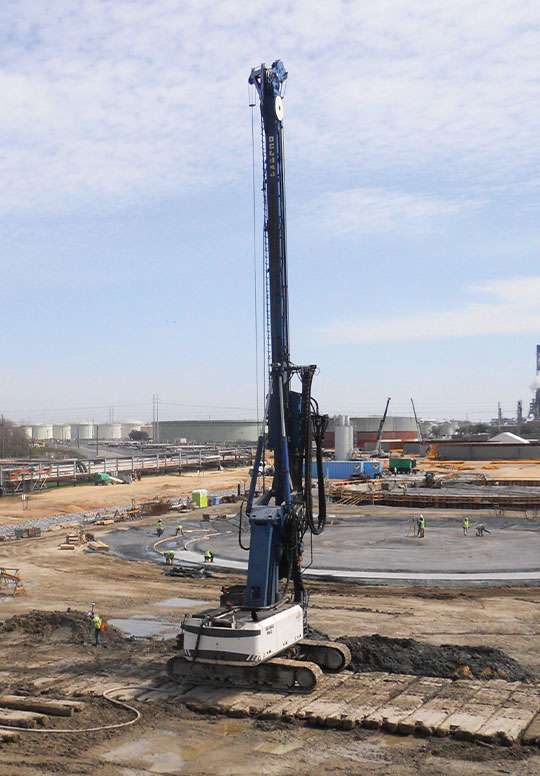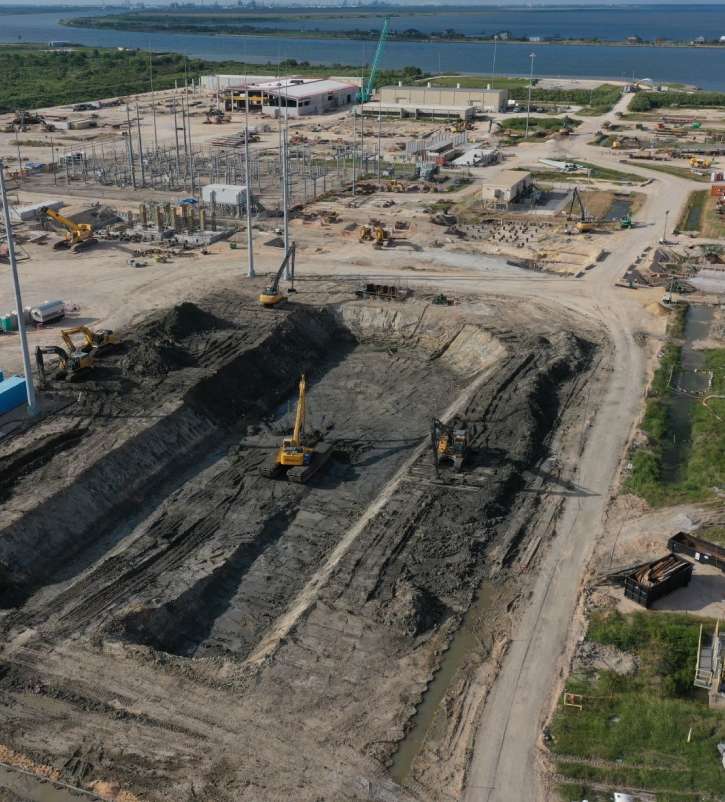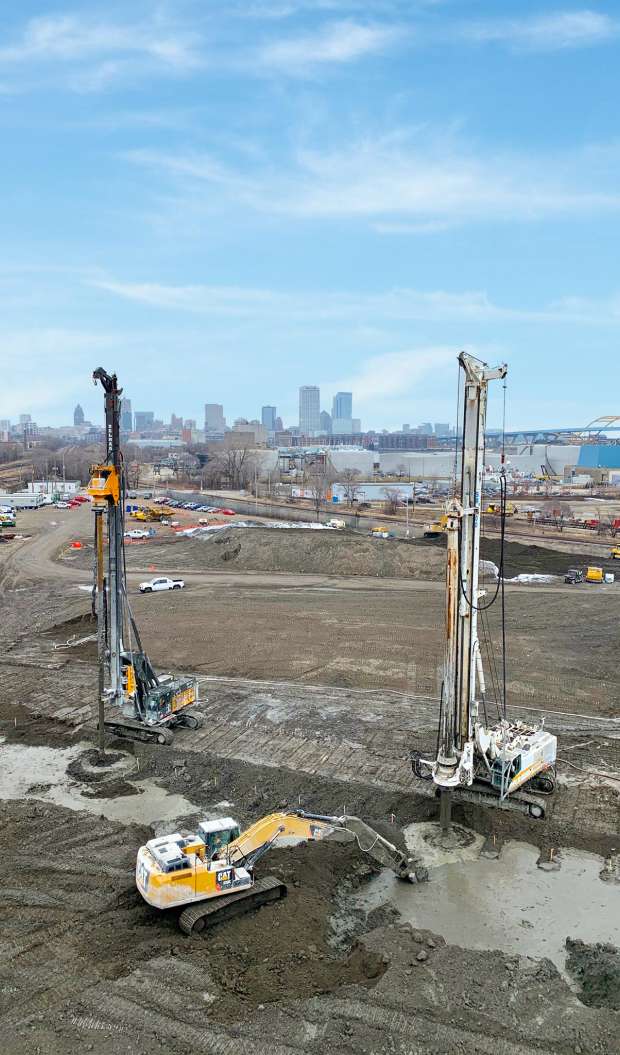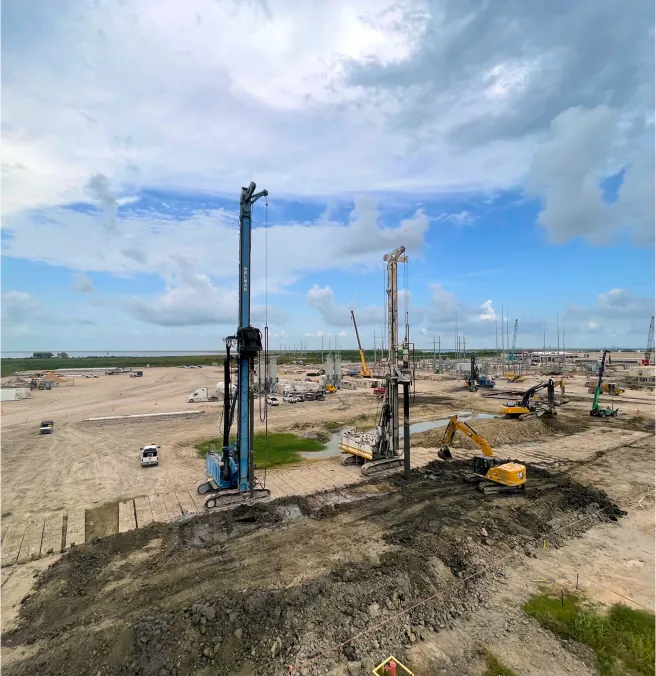Ground improvement
Ground improvement and/or modification is essential to build a stable and lasting foundation for any project. Whether the end goal is environmental remediation, preparation for civil applications, or stabilization to ensure future longevity, ENTACT has the expertise and equipment to get the job done right. Right doesn’t just mean completed safely and to scope expectations, it means on time and on budget, too.
While being comprehensive in our capabilities and methods, we also specialize in several specific ground improvement and geotechnical construction services, including:
- LNG facility site preparation
- E-commerce facility & data center site preparation
- Soil stabilization for industrial plant & tank farm expansion
- Foundation support for tank pad construction
- Ground stabilization & foundation support for commercial developments


Ground improvement, site preparation, & geotechnical capabilities
Offering a diverse range of ground improvement and geotechnical services allows ENTACT to address varying project requirements effectively and comprehensively. We strive to provide integrated solutions to foster greater collaboration and efficiency throughout the project lifecycle, ultimately delivering the most cost-effective and sustainable outcomes for our clients.
- Ground Stabilization
- Settlement & Liquefaction Mitigation
- Lateral Spread Mitigation & Control
- Deep Soil Auger Mixing (DSM)
- Slurry Wall Construction
- Sheet Pile Installation
- Soil Cement Columns for Deep Foundations
- Deep Soil Mixing
- Wet & Dry Soil Mixing & Conditioning
- Soilcrete Columns
- Overlapping Columns
- Cutoff Walls
- In-Situ Gravity Retaining Walls
- Shallow Excavator Bucket Mixing, Mass Solidification
- Earth Retention & Structural Support
- Large Earthmoving Operations for Site Preparation
- Site Dewatering, including groundwater extraction trenches, well points, & French drains
- Precision Regrading & Site Restoration

Geotechnical construction resources
At ENTACT, we are not just another geotechnical contractor, we are industry experts. For more than 30 years, we’ve been perfecting and exploring new ground improvement techniques. We’ve completed hundreds of soil mixing and treatments jobs and through those mixed more than 15 million cubic yards of soil. No company has more experienced field and technical personnel to deliver national, large-scale geotechnical construction solutions.
The resources ENTACT has at our disposal are also unmatched. We own an extensive fleet of standard heavy equipment, specialty equipment, and low-ground pressure equipment. ENTACT also maintains an in-house bench scale treatability laboratory that is capable of performing all studies for impacted and non-impacted media.
Specific services provided by our laboratory include:
- Material Homogenization
- Sample Aliquot Preparation & Weighing
- Reagent Weighing
- Dry & Slurry Reagent Blending
- Cylinder & Sample Preparation
- Pocket Penetrometer & UCS Testing
These unique resources allow ENTACT crews to self-perform ground improvement work, ensuring complete accountability and control of project quality, cost, and schedule.
At ENTACT, we take great pride in our soil mixing equipment being among the most advanced and well-maintained in the industry. Equipment includes, but is not limited to:
- Deep Soil Mixing Drill Rigs
- Grout Batch Plants
- Grout Pumps
- Cement Silos
- Soil Mixing Augers (4’ to 12’ diameter)
- Mixing Heads
- Large Fleet of Hydraulic Excavators
Frequently asked questions
Ground improvement is often necessary for projects situated on soft or loose soils, sites prone to settlement, areas with groundwater issues, or for large-scale industrial and civil projects. Ground improvement services also include the remediation of contaminated soils, ground stabilization for movement-sensitive projects like data centers and LNG facilities, as well as liquefaction mitigation in areas prone to earthquakes.
Ground improvement installations typically required minimal maintenance once completed. However, periodic inspections may be recommended to ensure continued performance and address any potential issues that may arise due to natural disturbances like tremors or earthquakes.
ENTACT is a full-service geotechnical contractor and able to self-perform nearly every kind of soil improvement. Common soil improvements include:
- Design and/or construction of Soil-Cement Columns and Load Transfer Pads for tank foundations support
- Construction of Soilcrete Retaining Walls
- Installation of Gravity Retaining Structures
- Mass Depp Soil Stabilization via In-Situ Vertical Auger Mixing
- Mass Shallow Soil Stabilization via Excavator Bucket Mixing
Yes, our ground improvement services are designed to minimize environmental impact and can be implemented in environmentally sensitive areas with careful planning, adherence to regulatory requirements, and use of eco-friendly materials.
Geotechnical construction promotes sustainable construction practices by optimizing the use of existing soil resources, reducing the need for extensive excavation and disposal of soil, minimizing construction waste, and enhancing long-term structural sustainability.
ENTACT can perform ground stabilization and improvement techniques at a variety of depths, ranging from surface-level improvements to 95+ feet sub-surface. The type of equipment and techniques used will determine the depth that can be achieved.
The most common soil stabilizer is Cement. Other frequently used reagents include Cement- Slag, Quick Lime, Fly Ash, and Fluidized Bed Ash.
Slurry Walls can be constructed out of different compositions and are used in a variety of different applications. Common Slurry Wall types are Soil-Bentonite, Cement-Bentonite, and Soil-Cement-Bentonite. Each have different structural and permeable properties. Common conditions where Slurry Walls are used include:
- Groundwater containment and/or control
- Containing wetlands hydrology
- Eliminating seepage into rivers and wetlands
- Preventing ground or surface water lateral flow underneath or behind dams
- Minimizing dewatering for deep foundation excavation or in mining operations
- Installation of above-ground water storage reservoirs
